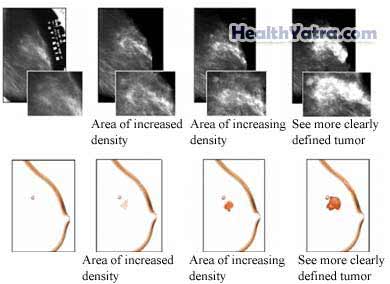Definition
This exam uses low-dose x-rays to make a picture of breast tissue. The picture is called a mammogram.
The United States Preventive Services Task Force (USPSTF) recommends that women aged 50 years and older get a mammography every two years. Other organizations recommend screening every year starting at age 40. Women who are at high risk forbreast cancer (for example, have a family history) may need to have mammograms starting at an earlier age and more often. Most organizations in the United States and Canada recommend regular screening. There are some differences of opinion among these groups, such as when to start and how often to have the screenings. Talk to your doctor about what is best for you.

Reasons for Test
This test is done to detect breast cancer. It may be done:
- As a screening test—in women without symptoms
- As a diagnostic test—to help make a diagnosis in women with symptoms like a lump or change in breast shape
- To help determine size and location of a lump before a biopsy or surgery
Possible Complications
Complications are rare. If you are planning to have a mammogram, your doctor will review a list of possible complications.
A mammogram does use radiation. You and your doctor will weigh the harms and benefits of this test. A mammogram may not be advised if you are pregnant. Be sure to discuss these risks with your doctor before the test.
What to Expect
Prior to Test
There are no special steps to prepare for this exam.
There is no proven method to decrease discomfort, but you can try:
- Scheduling the exam when breast tissue is least tender. This is most often a week after your period.
- Avoiding caffeinated drinks.
- Applying skin numbing products—The FDA has issued a warning about using skin numbing products (also called topical anesthetics) for this purpose.
NOTE: Tell the technician if you:
- Are pregnant
- Are breastfeeding
- Have breast implants—Ask if the facility uses special techniques to accommodate implants. Implants make it hard to see breast tissue.
On the day of your exam:
- Do not apply deodorant, talcum powder, lotion, or perfume near your breasts or under your arms.
- Ask your doctor if you should take a pain medicine like ibuprofen to relieve discomfort.
- Wear comfortable clothing so you can easily remove your shirt.
- Remove jewelry.
- Bring copies of previous mammograms and reports with you. If you have them done in the same facility each time, they will have results from prior years. The doctor can compare the old images to the new ones.
- Describe any breast problems to the technician before the exam.
Description of Test
You will stand in front of a special x-ray machine. It has a platform to place your breast on. The technician will adjust the height of the platform. One breast will be lifted and placed between special plates that hold film. The plate is brought close to the platform and compresses the breast. This allows for a clearer image. The exam will cause some discomfort. Tell the technician if you feel any pain.
At least two pictures of each breast are taken. For one picture, you face toward the platform and the image is taken looking down at the breast. For a second common image, you stand beside the machine for a side view. Extra images may be needed if you have implants. Your doctor may also need more images if this test is being used to help make a diagnosis.
After Test
You will wait in the facility until the x-rays are developed. More images may be needed. You can go home after the exam.
How Long Will It Take?
30-45 minutes
Will It Hurt?
You may feel some discomfort and pain.
Results
The radiologist will look at the images and may speak with you at the end of the exam. You will usually receive your results within seven days. If you do not, call and ask for the results.
Your doctor will have a report and either send you a letter or talk to you about your condition. The next mammography is usually done in 1-2 years if everything is normal.
Mammograms can sometimes detect things that look like cancer, but are not. If something is noticed on the mammogram, you may need to have other tests done, like an ultrasound or a breast biopsy. This will help determine if there is an actual problem or if everything is fine.
Also, like all screening tests, the mammogram will not detect every single abnormality.
Call Your Doctor
After the test, call your doctor if any of the following occurs:
- Changes in a breast, including a lump or thickening
- Skin discoloration or discharge from the nipple
